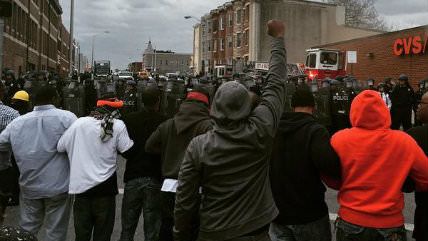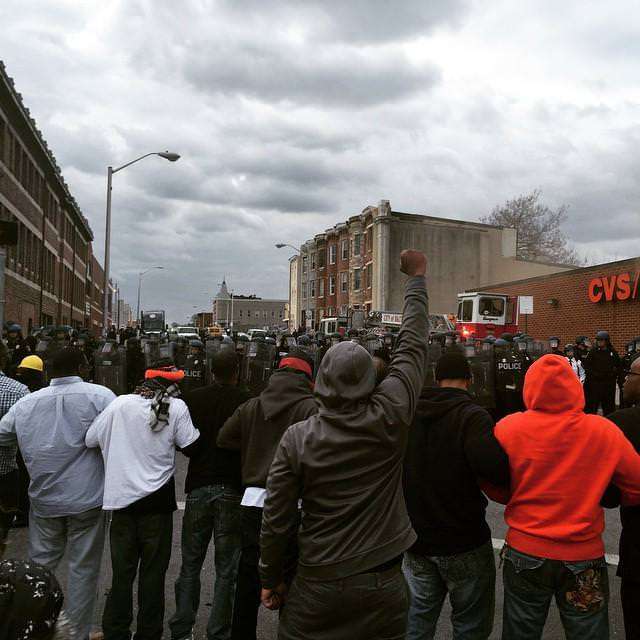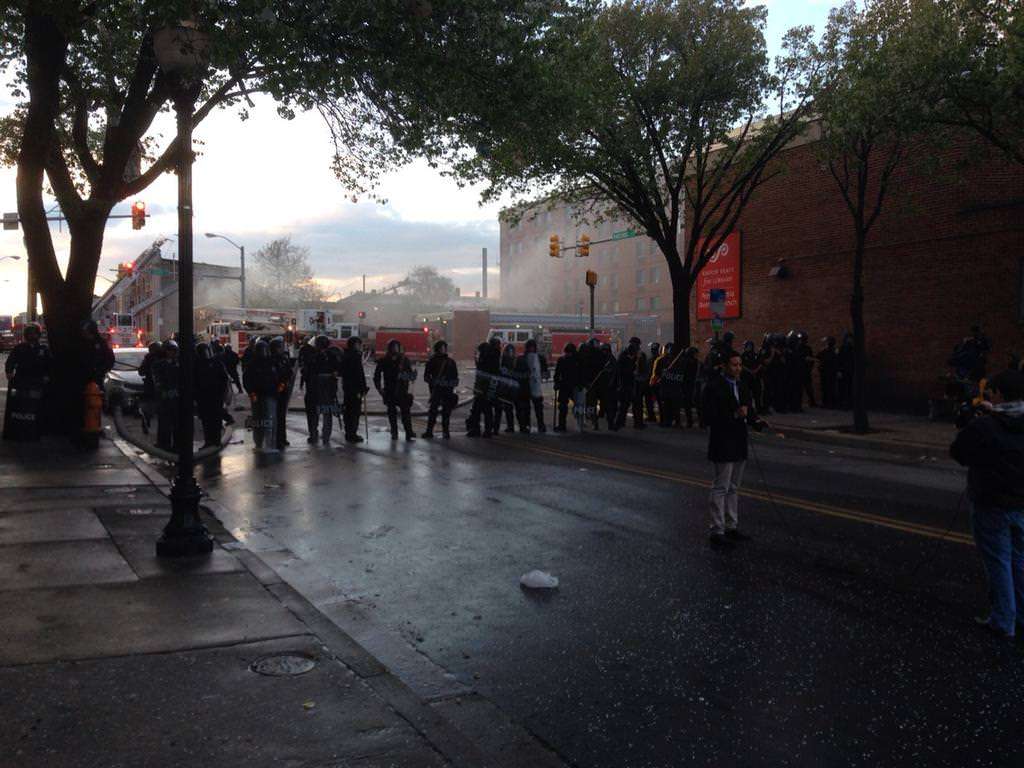Resistance Isn't Always Rational
We needn't endorse the means of desperate people to acknowledge their ends are worth fighting for.


I agree with Robby Soave that non-defensive violence is not a good solution, both for moral and tactical reasons. But I nonetheless find myself filled with empathy for the people—rioters? protesters?— who have been engaging in acts of violence against police property, corporate property, and police themselves this afternoon and evening in Baltimore. That's not to say I condone their acts, but I find them understandable. Resistance isn't always rational, nor necessarily kind. Or, to say it another way, desperate people do desperate things. And it is very clear that there are a lot of people in this country in a state of desperation over our unaccountable, ever-encroaching, fee-mongering, violence-first police force and its myriad biases.
I was never a police hater or even much of a police skeptic, you guys. Sure, I believed in bad apples and bad laws—especially concentrated on/around bad policy, like the drug war—but I still believed the vast majority of individual cops and law enforcement agents were basically good. And they still may be, but it doesn't really matter in the face of a system that's so thoroughly stacked, at all levels, against the vulnerable and disenfranchised, as well as toward the perpetuation of its own power and unaccountability. Covering "criminal justice" in various ways for the past year and a half at Reason—from the crafting of legislation aimed at cracking down on criminals of various sorts and the swelling/moral squalor of America's jails and prisons to individual instances of police abuse and the "general warrants" that are vice laws … I don't necessarily think most cops or prosecutors are bad people, but they're fucked (as are we all) by a sweeping, self-perpetuating schemata that knows but one problem and one solution: bad guys and more (thorough) more (prisons) more (funds) more (fear) more (MORE) law enforcement.
Meanwhile, a lot of people still want everyone to pass the perfect victim and perfect rationality test in order to gain at least a shred of sympathy. Last week I wrote about a woman, Suzanne Guzman, who saw her son kidnapped out of her driveway (dad had put him, sleeping, in the family car and then went back inside for a moment) and called the police, a situation that resulted in mom being thrown down, handcuffed, and arrested along with her husband while friends helped locate their son and car. The trouble started when the woman refused to let police into her house until her husband, who was out searching for their son, returned; her initial reason was that she had two big, unfriendly dogs he needed to corral.

Police insisted it was policy to first check the house—maybe the boy went back inside (or maybe she was a murderer). Yes, you and I can see, reading about this dispassionately from the Internet, that this is not an entirely unreasonable request and the whole process would probably have gone a lot smoother if she had just wrangled the dogs herself and let the cops in. In any event, her shouting at them and getting immediately defensive didn't help. But neither did the cops' utter lack of warmth, patience, or empathy.
It's not too hard to put yourself in this woman's place, is it? Her son is missing; there's 911 audio of her in hysterics. She's desperate—and here police are seeming to not believe her version of events and not be putting their best efforts into what she believes will help find her son. She has difficult dogs—cops have been known to shoot those. Maybe she is breaking some sort of unrelated law—maybe there's an eighth of weed, a friend's painkiller prescription, or an unregistered weapon inside. Some might say all these pale in comparison to helping cops find one's child, but there was (and she knew this) already an Amber Alert and a cadre of cops out looking for him. Perhaps Guzman judged that nothing was to be gained by letting cops in immediately to search for a son whom she knew wasn't inside; in fact, it could make things worse. If now-agitated officers discovered some infraction in the midst of their search, they may have charged the Guzmans or even tried to take their children away.
Police haven't been above arresting crime victims for low-level offenses in the midst of investigating their cases. When I highlight a case like the Guzman's, it's not necessarily to say, what terrible people these individual cops involved are! but because all these individual instances add up to something. I'm not sure anyone knows what exactly that is yet—there's racism involved, sure, but also poverty, and power, militarization, pay-for-play officers, petty fines, police unions, and a whole lot of cops shooting the mentally ill. There is no simple answer, but some things, or many, are clearly and desperately amiss.
Beyond the harm caused to individual victims and their loved ones, or the outbursts that capture national attention as in Baltimore right now, each of these stories, from the relatively minor to life altering to the fatal—each Suzanne Guzman and Danielle Meitiv and Shona Banda, each Freddie Gray, Eric Harris, and Walter Scott—breeds more of a stealthily toxic dynamic between police and those they're supposed to be protecting. People in certain communities have long preached the axiom "never call the police" (i.e., they'll only make things worse). It's getting to the point where that advice seems wise for a wider and wider swath of people.
Perhaps our perfect victims will never have to worry. But most of us are not perfect victims. And some could never be no matter how rule-abiding their lives. We shouldn't be asking people to be perfect before they deserve respect, constitutional protections, equal treatment under the law, and a modicum of understanding.
I'm a pretty mild-mannered and non-confrontational person, but I've raised my voice at overzealous traffic cops and excessively bureaucratic customer-service reps. Dealing with a seemingly needless level of surveillance and inflexible-authority can be frustrating. Imagine if that was your only or ongoing experience with law enforcement. Imagine if those traffic cops had a robust record of randomly shooting people who looked like you.
Those rioting and perpetuating violence against Baltimore cops weren't being imminently threatened. It's easy to point fingers at them. It's warranted on one level. But we all know that, right? We also know that in some cases, history forgives non-directly defensive violence. It's a hyperbolic comparison, sure, but those boats full of British tea weren't directly threatening anyone's life or liberty.
All I'm really trying to say is there's a binary in blame that's both all too prevalent and all too unproductive. We needn't endorse the means of desperate people to acknowledge their ends are worth fighting for, nor must imperfect acts of resistance prove the roots of this resistance unworthy. Condemning the counter-productiveness of such acts is fine, but it shouldn't ignore the context these imperfect acts take place in. Sometimes people take to the streets not with well-planned political agendas or thoughts to how it will play out on Twitter but with a raw, terrified, excitable, and justified anger at an unjust state.


Show Comments (352)